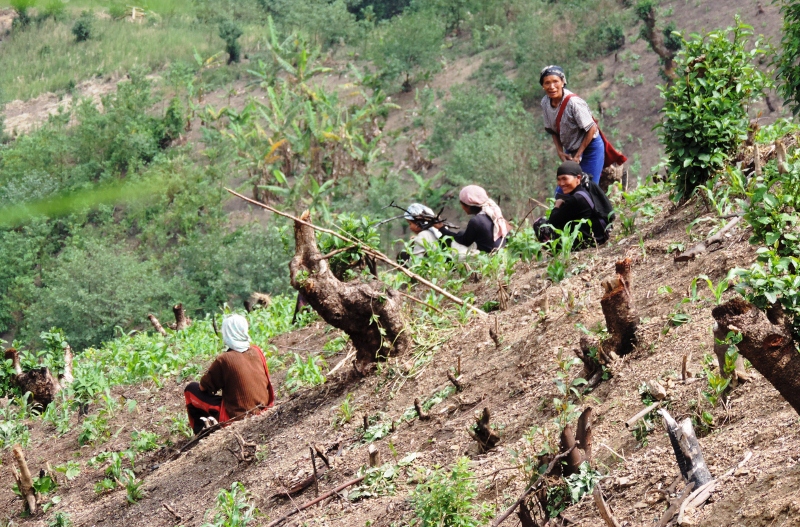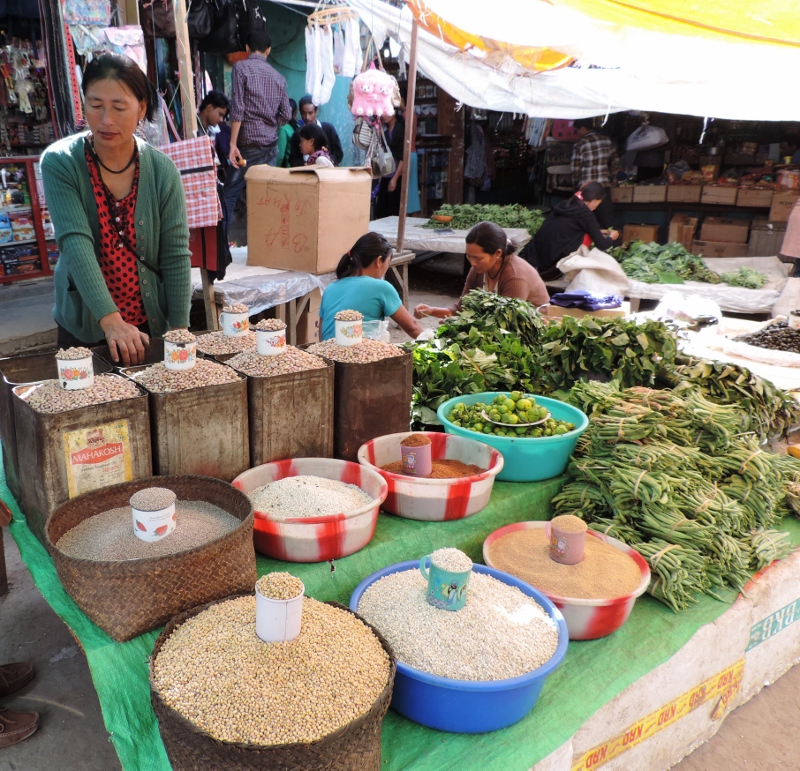High Up In The Naga Hills Women Are Discovering Collective Strength
From being dependent on their husbands and fathers for basic needs to becoming self-dependent and getting their children educated from their own money, women's lives in Nagaland's Tuensang district have changed. They now demand better schooling for their children, fight for government entitlements, and articulate issues once considered too sensitive to discuss publicly, like alcoholism and wife beating. Read along to know about this remarkable transformation.

From being dependent on their husbands and fathers for basic needs to becoming self-dependent and getting their children educated from their own money, women’s lives in Nagaland’s Tuensang district have changed. They now demand better schooling for their children, fight for government entitlements, and articulate issues once considered too sensitive to discuss publicly, like alcoholism and wife beating. Read along to know about this remarkable transformation.
Tuensang, Nagaland’s largest district, wears its forest wealth proudly in the myriad shades of green that clad the undulating terrain of the Naga Hills, which stretch on and on, right up to the Burma/Myanmar border. Located at the very edge of the country, this district has quite literally been edged out of mainstream discourse. Poor connectivity and a difficult terrain have contributed to Tuensang’s marginalisation. Added to this is the fact that it has been a site of conflict – whether it was the insurgency waged by the two factions of the Nationalist Socialist Council of Nagaland (NSCN), or inter-tribal tensions that have sometimes flared up into bloody confrontations.
Like their ancestors, people here still largely depended on jhum farming for their livelihoods but pressure on the land because of the growing population and widespread soil erosion resulted in dwindling harvests and growing impoverishment. The burden of keeping families going in such circumstances invariably fell on the women. Even a casual visitor to these parts is immediately made aware of the pivotal role they play – it is the women who seem to be doing the farming, ferrying water, hewing wood and even running small shops and tea houses. Extremely shy, they dive behind a tree or under a shop counter, quick as a flash, if a stranger attempts to draw them into a conversation. They do this with a smile, but those ready smiles hide many grim realities.

Their faces bear the ravages of the harsh sun and mountain winds, and their backs are weighed down by heavy loads of timber needed to keep home fires burning. But far more disturbing than these physical hardships is the age-old discrimination inscribed in community norms and practices. Traditionally, women don’t inherit property or participate in community decision-making. To this day, women’s political representation in the Nagaland state assembly is among the lowest in the country. Yet they keep going, these strong, resilient women, weaving their incredibly striking shawls on old looms and farming rice and corn on vertiginous hill slopes.
It is in such unlikely circumstances that the Tuensang-based NGO, the Eleutheros Christian Society (ECS), in partnership with ActionAid, the well known organisation working for social change, could make a difference to the lives of thousands of women in the 16 villages of the region that the programme adopted.
The ECS was set up in the early 1990s to help the Chang tribe of Tuensang address the innumerable social adversities they experienced. Tuensang district was on the drug route, given its porous borders with Burma/Myanmar, and drug addiction and HIV/AIDS was a huge challenge. It was also clear that many women were in dire straits. Phutoli and Chingmak Kejong, founders of ECS, recalled how women would approach them for small loans of two or three rupees just to feed their children a meal. By the late 1990s, ECS had set up around 37 Self Help Groups (SHGs). Notes Chingmak Kejong, “Women of the Chang tribe had never been part of formal social structures and institutions. We sought to change this.”
This grassroots work was significantly scaled up when ActionAid forged a decade long partnership with the ECS in 2001. The SHG was re-conceptualised as an entity that would empower women not just financially but develop their abilities to fight for their rights. Slowly, through discussions with the community, the ECS-ActionAid programme came up with a strategy to combine microcredit interventions with social action. By the time the programme came to an end in 2010, there were no less than 240 SHGs in the region. Today, the number of SHGs has grown and their combined corpus is around Rs 5 crore, according to Kejong.

To understand the significance of such change, one only needs to meet women like Thonti Naro, a farmer in Chingmei village, who informs me proudly that she had earned Rs 2,000 within two hours by selling her farm produce just the day before. Her village has seven SHGs, each classified alphabetically, and Naro belongs to Group C. According to Naro, the best thing about being a SHG member is that the local women can do things together. “In the old days, I found it difficult to go to town by myself and interact with strangers, but now two of us go to the market,” she reveals.
Toshila Chang of the ECS explains the thinking behind this strategy, “Two is an optimal number. Two women can help each other load and unload the wares. If more went on these trips, the money spent on bus fares would go up and cut into their earnings.”
In the same village I caught up with Maro, Mongshai and Anti, who were part of a nine-member SHG that was set up in 2010. Each of the women in the group had invested Rs 2,000, and their SHG now had a corpus of Rs 45,000. Anti describes the group’s evolution, “We began lending money within the group, charging only a nominal interest of two per cent. To people outside the group we charged an interest of three per cent. We then decided to go beyond merely lending and started investing in small items required by our village people for their daily requirements, which we would bring in from town and sell at a modest profit. We would take the early morning bus to Tuensang town – the district headquarters – buy our supplies and get home on the evening bus.”
Later, the women grew more ambitious. They made better use of that trip to town by taking their farm produce, whether it was cabbages, ginger or chillies, to sell at higher rates. After selling their vegetables, they would buy the sugar, milk, tea leaves and clothes needed in the village and bus their shopping back. Earnings thus doubled. Of course, if there was money to be made, there was a price to be paid as well. “Although we are used to carrying loads, sometimes our necks and lower backs would hurt dreadfully,” admits Anti.

What keeps these groups together? For one, all the women are from the Chang tribe. For another, they have internalised the spirit of collective functioning. “We knew that we would only gain if we stood together. Misunderstandings were quickly sorted out,” Naro explains. They also discussed their experiences. This led them to demand better schooling for their children, fight for government entitlements, and articulate issues once considered too sensitive to discuss publicly, like alcoholism and wife beating.
This was ultimately about asserting agency. A middle-aged woman from Hakchang village in Tuensang related how her SHG involvement impacted her life. When she lived with her husband’s family as a newly-married woman, she had to depend on her father-in-law for even some soap. Once she joined an SHG and began to earn for herself she could buy more than a bar of soap – she could get her children a better education and ensure they ate better.
In time, these SHGs ushered in a transformation in local attitudes towards women. They were now treated with respect and their savings went into improving village infrastructure. The men who had once resented the time their wives spent outside their homes in SHG activities were less hostile as they saw the money coming in. They no longer complained if asked to load vegetables on to a bus!
Tuensang’s SHGs constitute just a small step towards gender equality in a state where being a woman is still a disadvantage and where even the government mandated 33 per cent reservations for women in local bodies has hit a road block. But Chingmak Kejong believes that the SHGs have given Tuensang’s women both money and agency and this will soon start talking.
Liked this story? Have something to say? Write to us: [email protected] or join us on Facebook and Twitter (@thebetterindia).
If you found our stories insightful, informative, or even just enjoyable, we invite you to consider making a voluntary payment to support the work we do at The Better India. Your contribution helps us continue producing quality content that educates, inspires, and drives positive change.
Choose one of the payment options below for your contribution-
By paying for the stories you value, you directly contribute to sustaining our efforts focused on making a difference in the world. Together, let’s ensure that impactful stories continue to be told and shared, enriching lives and communities alike.
Thank you for your support. Here are some frequently asked questions you might find helpful to know why you are contributing?


This story made me
-
97
-
121
-
89
-
167











